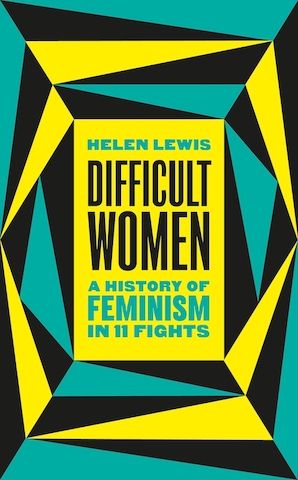
Difficult Women – A History of Feminism in 11 Fights
Zoe Wide reviews Helen Lewis book 'Difficult Women – A History of Feminism in 11 Fights' (published 2021). She particularly explores what the present climate movement can learn from feminism’s past.

Well-behaved women don’t make history: difficult women do.
Published by Puffin Ladybird, 2021
What the present climate movement can learn from feminism’s past
In the online feminist sphere the routinely misquoted phrase “Well behaved women rarely make history” is prevalent. It’s often plastered across photos of Marilyn Monroe, t-shirts of dubious quality and the feminist staple, a tea towel. Despite the pop-culture fondness for this mantra, feminist history is often reduced to a perfectionist retelling, anything ‘unseemly’ is blotted out and the lives of women remoulded to meet a socially acceptable feminine ideal. Helen Lewis’s debut book “Difficult Women: A History of Feminism in 11 Fights” goes beyond tokenistic girl power rhetoric to present a history of women who changed the world, complete with their hypocrisies and flaws. On the surface this book may not appear to be a “green read”. However, if we view the presented stories with an intersectional perspective, there is much we can learn from the history of feminism (and particularly difficult feminism) that may strengthen the climate movement.
The real-life stories in Lewis’s book are testimonies to the power of being difficult. If you’ve ever though that civil disobedience caused more harm than good, or you’ve been afraid to talk to your friends about the uncomfortable truth of climate change for fear of being a “downer”, this is a book for you. As “code red” sounds for humanity in the face of the climate crisis, we all need to take inspiration to be more difficult. Whether this is sitting in roads, pestering your MP or writing reports that challenge the ways things have always been. Many of the women mentioned in the book were branded as “Difficult” during their lives, to smear their reputation and to discredit their work. This is not much different to protesters being labelled as a “nuisance” and anyone with a vaguely liberal opinion being deemed a “snowflake”. Lewis reclaims words such as nuisance and sees them not as a pejorative but a tool in our arsenal for social change.
A fundamental principle of Lewis’s book is that Imperfection does not devalue the contribution of a movement. For example, one women she examines is Erin Pizzey, the creator of the UKs first women’s refuge (Now the charity Refuge). During her political career Erin Pizzey had a “fractious” and “poisonous” relationship with organised feminism. Pizzey saw herself as a “plain spoken house wife, who held no truck with the ideologically-obsessed blue stockings she found in the women liberalisation movement“. This, coupled with barriers caused by class, education and aspiration, as well as Pizzey’s intense dislike of formalised structures, led her to distance herself from the women’s liberation movement. By ploughing her own furrow Pizzey “single handedly did as much for the cause of women as any other woman alive” Reporter Deborah Ross. Wrote in 1997. However, Pizzey now campaigns for a dubious Men’s Rights organisation, and some of her political stances such as “Feminism is a lie” that “Encourages women to be victims” seem eye-wateringly out of touch. Lewis argues that Pizzey’s ‘difficult’ opinions and her most recent political endeavours do not undermine the value of her earlier work; she should not be written out of history as punishment for being imperfect.
Perfectionism is a tool often used to derail and discredit the climate movement. I’ve supported school strikes where well-meaning young people have been harangued by adults deriding their actions because the strikers’ parents have diesel cars, or the young people have smart phones. Climate activists are often subjected to moral policing. How dare they hold up a road in protest, when the fumes from resulting congestion are contributing to climate change? Oh the hypocrisy! This can leave activists feeling demoralised and deflated. If we can’t achieve perfection, why should we even try. It wasn’t until I read Lewis book, I realised the focus on perfection was not just a critical examination of a movement, but a deliberate and toxic tactic used to demobilise change. We cannot be perfect because we do not live in a perfect society. As I read the book, I realised I was expecting Lewis herself to be perfect, showing how ingrained these expectations have become. Lewis’s knowledge of corsets is questionable, and the book had an unclear stance on the rights of transgendered women. However, as an author Lewis is refreshingly self-aware, recognising her work cannot be perfect. By addressingthe readers socialised need for perfection, Lewis creates space for the reader to challenge and explore her work. By recognising the climate movement can never be perfect, we can learn from our mistakes rather than beingdemobilised and demoralised.Furthermore, if we recognise tacticssuch as expectingperfection, for what they are – tools ofthose who try to derail social change we move a step closer to overcoming these obstacles, increasing the resilience of the climate movement.
In the conclusion of the book Lewis highlights the importance of collective movement over the action of individuals. In the case of feminism Lewis points out much time could be wasted arguing over whether feminists should or should not shave their legs. Lewis suggests that arguing over relatively insignificant personal choice will never result in significant societal change. The climate movement is at risk of relying too heavily on individual action. It could easily loose it’s self in arguing over who recycles more, or who drives less and whether veganism really is the answer. These individual actions alone will not result in complete system change without a collective movement. Lewis’s book gave me an understanding of how focusing on individual action can harm a movement, whether this division is tactically orchestrated by opposition or through an individual’s innate desire to feel immediate change. Lewis cleverly and perhaps unintentionally illustrates how united we stand but divided we fall.
After reading the book I could understand the urge to burn bras and smash windows (if only bras weren't so expensive). I felt a sense of freedom from my fears of being controversial and from the need to behave in ways that conform to societal expectation. The women presented to me in this book weren’t far off ideals of perfection, far from my reality as a permanently exhausted twenty something. These women were complicated, multifaceted, brave, and regularly wrong. They were creative, passionate, irritable, unapologetic and some held beliefs I strongly disagree with. I could relate to many of them. If these difficult women could change the world why should I fear being difficult if doing so could be utilised as a strength. To all female activists and allies of female activists, I urge you to read this book. Too often women (and other marginalised groups) are socialised to behave, to remain likeable and uncontroversial. Breaking free of this expectation will allow women to reach their full potential and utilise it for positive change. Progressive as the climate change movement can feel, there is a significant gender gap. For example, only 15% of the COP26 leadership team were female! This is astounding given that women are statistically more vulnerable to climate change, particularly women living in the global south. We need to empower and embolden as many women as possible to join the climate movement. I feel that embracing our right to be difficult may be that starting point.
To summarise, to strengthen the climate movement we need to act collectively, embracing our imperfections and realise there is power in being difficult. If you are unsure how to begin being difficult and don’t fancy going full suffragette and breaking a window, I suggest reading this book as a good starting point.





